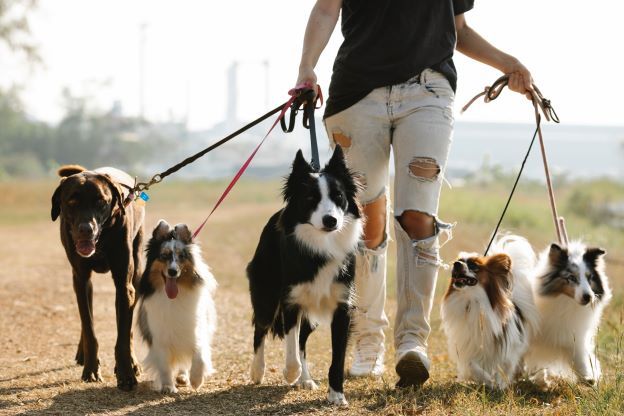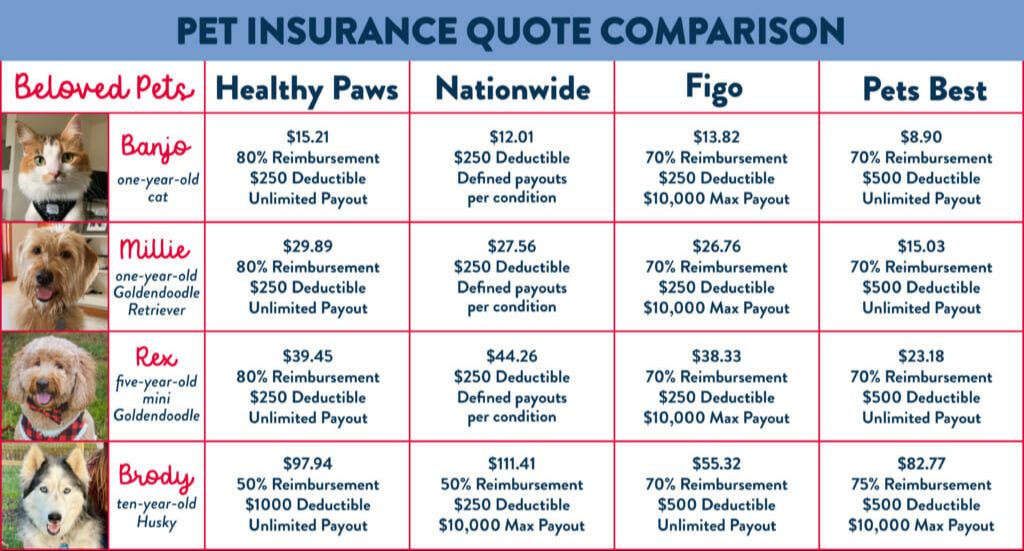Introduction
Walking dogs can be a fun and rewarding way to make money as a small business or side gig. With busy work schedules and changing lifestyles, the demand for professional dog walkers continues to grow. The dog walking services industry in the US is valued at over $1 billion as of 2023 and has seen steady growth in recent years (Source). As more pet parents seek help caring for their dogs, questions arise around insurance needs and coverage for dog walkers.
Getting the right insurance as a dog walker provides protection in case the unexpected happens. But with various policy options available, it can get confusing to determine what’s truly necessary. This article will explore common insurance types for dog walkers, what coverage is typically included, what factors influence cost, ways to reduce risks, whether insurance is legally required, and key considerations to help dog walkers make informed insurance decisions.
Benefits of Insurance for Dog Walkers
There are several key benefits for dog walkers to have insurance coverage. Liability insurance is important to cover costs in case a dog bites or injures someone while under the walker’s care. According to https://www.petcareins.com/dog-walkers-insurance, policies cover dog bite claims up to $1 million. Veterinary care coverage helps pay vet bills if a dog gets sick or injured when with the walker. As stated on https://www.nextinsurance.com/business/dog-walker-insurance/, this provides peace of mind so the walker isn’t fully responsible for high vet costs. Insurance gives dog walkers important financial protection for potential liability with the dogs under their care.
Types of Insurance Policies
There are a few key types of insurance policies that dog walkers should consider carrying:
General liability insurance covers any bodily injury or property damage claims that happen during a dog walking appointment. This protects you if a dog bites someone or causes an accident while under your care. According to Next Insurance, general liability policies for dog walkers start at around $8 per month and provide up to $1 million in coverage. The policy also includes limited coverage for medical payments and legal defense costs.

Pet sitter insurance offers protection specifically tailored to the risks of pet care professionals. This can include coverage for theft of pets, veterinary care if a pet is injured, and reimbursement for damage caused by pets. According to The Hartford, pet sitter insurance starts around $27 per month for $500,000 in coverage. Higher policy limits are also available.
Commercial auto insurance covers your vehicle and anyone you injure while driving for business purposes. This is important if you transport dogs in your car. Commercial policies are more expensive but provide higher liability limits to adequately protect a business. Rates vary significantly based on your driving record, vehicle, and location.
What Insurance Typically Covers
A standard dog walker insurance policy will cover a range of liabilities and damages that may arise during business operations. Some key things dog walker insurance will typically include:
Third party liability – This protects the business if a dog in the walker’s care were to bite or injure a third party, or damage someone else’s property. Policies usually cover both legal defense costs and any damages awarded in a lawsuit (Source: https://www.petcareins.com/dog-walkers-insurance).
Medical payments – If someone is injured by a dog in the walker’s supervision, this covers their medical bills, regardless of fault. This can be critical to maintaining good relationships with clients (Source: https://www.thehartford.com/business-insurance/dog-walking).
Damaged property – Covers repairs or replacement if a dog causes damage to property, either a client’s home/belongings or third party property.policies may offer coverage from $25,000 up to $1 million (Source: https://www.petcareins.com/dog-walkers-insurance).
Business equipment – Provides coverage for items like leads, pet waste bags, cleaning supplies, or other equipment stolen or damaged during work activities (Source: https://www.thehartford.com/business-insurance/dog-walking).
Factors That Affect Cost
The cost of insurance for dog walkers depends on several key factors:
Location
Where you operate your dog walking business affects your rates. Areas with higher crime rates or more dog attacks typically have higher premiums. Urban locations also tend to cost more than suburban or rural ones (https://www.nextinsurance.com/business/dog-walker-insurance/cost/).
Number of dogs
Insurers will factor in the number of dogs you care for. More dogs means higher potential liability, resulting in higher premiums (https://www.thimble.com/blog/dog-walking-insurance-cost).
Years in business

New dog walkers are seen as higher risk and will pay more. After several years claims-free, premiums often decrease as you establish a track record (https://www.petcareins.com/dog-walkers-insurance).
Claims history
Past claims will drive your rates up. Dog walkers with clean records will qualify for lower premiums.
Ways Dog Walkers Can Reduce Risk
Dog walkers should take steps to minimize liability risks through proper training, established procedures, clear service agreements, and health checks. This can reduce the likelihood of incidents and also help demonstrate responsible practices if an incident does occur. Some specific ways for dog walkers to reduce their risks include:
Obtaining training and certifications related to dog walking demonstrates an appropriate skill level. Certifications like the Doggie Development Certification show a commitment to best practices. Ongoing training is also important as a dog walker gains experience. First aid and CPR training can equip walkers to handle emergencies.
Establishing clear procedures for safely handling dogs, transitioning between owners, and securing dogs and homes helps prevent predictable incidents. Following a routine and avoiding distractions creates a controlled environment. Carrying liability insurance and following all related requirements also demonstrates responsible business practices.
Thorough service agreements outline responsibilities and set expectations between the dog walker and pet owner. This includes the care to be provided, costs, pickup/dropoff logistics, and contingency plans if the walker is unavailable. Vet records, vaccine information, medical conditions, temperament notes, and emergency contacts should be collected.
Ensuring dogs are healthy enough for walks or daycare reduces the chance of medical issues. Requiring veterinary records, restricting very young puppies, and delaying services following injuries or surgery are reasonable risk reduction steps. Pre-screenings to assess behavior may also be appropriate.
Alternatives to Insurance
Though having insurance offers valuable protection, many dog walkers consider alternatives to reduce risk and limit expenses. Some of the most common alternatives include:
Setting aside emergency funds. Rather than paying ongoing premiums, some dog walkers put money aside in a savings account to cover potential incidents or vet bills. According to Pet Sitting Insurance USA Comparison Chart, this allows more control over how funds are used in an emergency.
Careful screening of dogs. Thoroughly vetting each dog’s temperament and health can help identify and avoid higher-risk dogs. The Pet Care Insurance site notes that gradually introducing new dogs and not overloading capacity also helps reduce potential incidents.
Limiting number of dogs. Walking just one or two dogs at a time drastically cuts the chances of scuffles or injuries compared to larger groups. As Your Definitive Guide to Pet Sitting Insurance explains, some walkers limit groups to dogs from the same household to further reduce risks.
When Insurance Is Required
In certain situations, having insurance is mandatory for dog walkers:
Working as a contractor for a company: If you work as an independent contractor for a dog walking company, they may require you to carry your own general liability insurance even though you technically work for them. This protects the company from liability in case you cause any damage or injury while on the job.

Local regulations: Some states and cities require pet sitters and dog walkers to be licensed and insured in order to operate legally. For example, Florida requires all dog walkers to be licensed and bonded. Be sure to check your local regulations.
Client requirements: Many clients specifically look for insured dog walkers and may ask to see proof of insurance before hiring you. Carrying insurance shows clients you are a professional and have coverage in case of incidents.
Having business insurance is crucial for operating responsibly as an independent contractor. Check professional associations and regulations in your area to determine if it is required. Many dog walking companies and clients will expect you to carry your own liability coverage as well.
Final Considerations
When deciding whether to get insurance for a dog walking business, it’s important to carefully evaluate policies, understand all the fine print, and find the right balance between costs and risks covered. Here are some final tips:
Shop policies from multiple providers and compare not just premium costs but also coverage details. Look for a policy that protects against both liability and business losses at a reasonable rate. According to one source, basic coverage starts around $139 annually but can cost more with enhanced protection (https://www.petcareins.com/dog-walkers-insurance).
Read the fine print to see exactly what circumstances and incidents are excluded from coverage. There may be breed restrictions, for instance. Make sure the policy aligns with the services you plan to provide. Look for coverage of both injury to people and damage to property.
Evaluate the risks associated with your specific business model and location. Will you walk in public parks or keep dogs overnight? Do you employ other walkers? Factors like these affect the chance of claims. Get sufficient coverage for your situation but don’t overpay.
With smart shopping and understanding of policy details, dog walkers can secure insurance that provides peace of mind without cutting too much into business profits.

Conclusion
Insurance is an important consideration for dog walkers to protect themselves financially and legally. The main types of relevant insurance are general liability, care custody and control, and bonding and surety. Policies cover costs associated with property damage, bodily injury, theft, and more. While premiums vary based on factors like experience and number of dogs, there are ways to reduce risks and costs. Alternatives like setting up an LLC are not full substitutes. Many clients require proof of insurance. Ultimately, dog walkers need to evaluate their specific situation and comfort with risk versus the peace of mind insurance provides. With the right policy, they can run their business safely and successfully.
